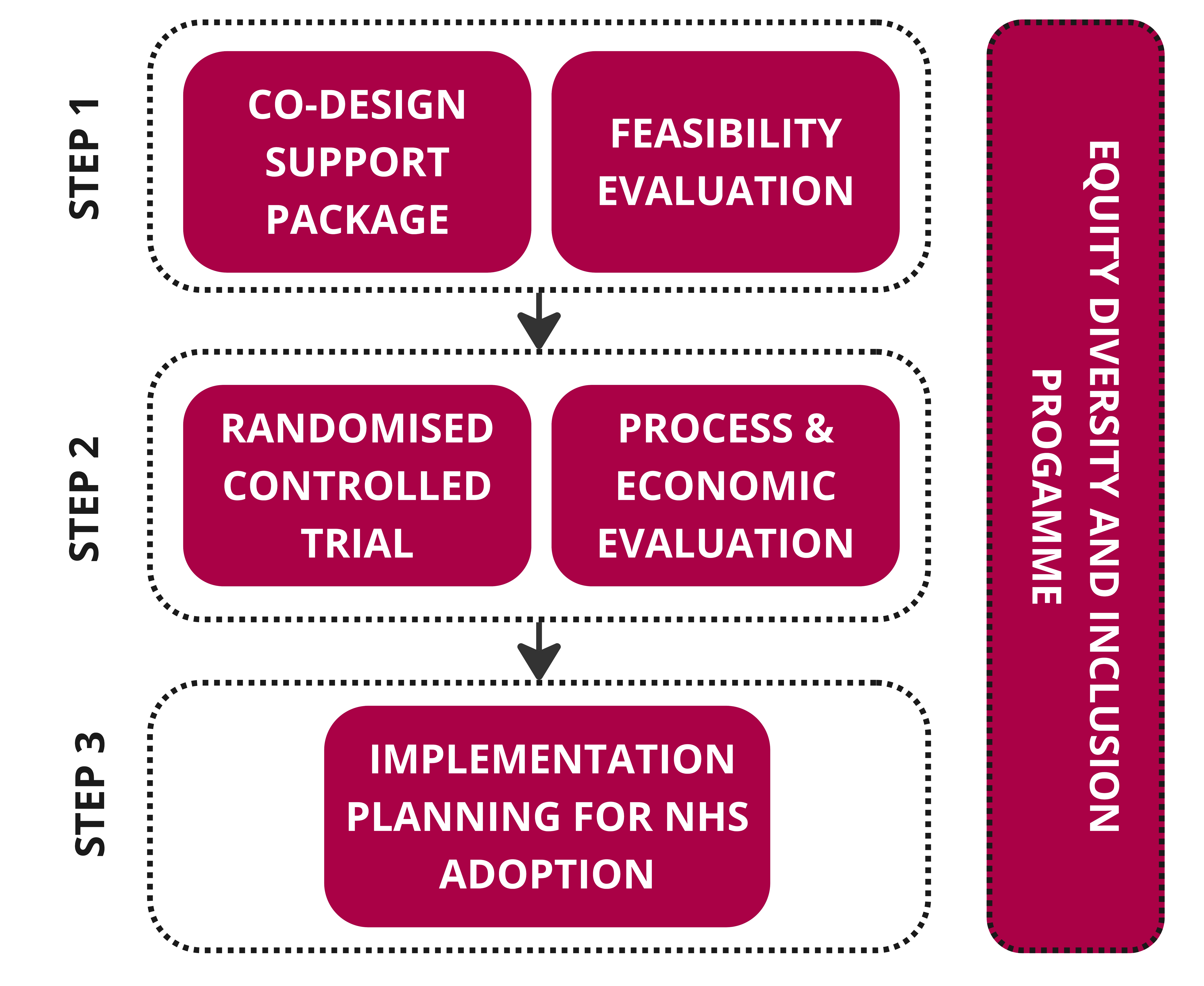The UPTURN research programme launched in June 2023. It is a five-year, £2.8m project funded by the National Institute for Health and Care Research. UPTURN aims to help people with Chronic Obstructive Pulmonary Disease (COPD).
COPD is a common lung condition where it is difficult to breathe air out of the lungs because the airways are narrowed. The condition mainly affects middle-aged or older adults who smoke or have smoked, and symptoms include breathlessness, a persistent cough, wheezing, and coughing up more phlegm than usual. People with COPD should be offered a treatment programme called Pulmonary Rehabilitation (PR).
What is Pulmonary Rehabilitation (PR)?
PR is a treatment programme of exercise and education designed for people living with a lung condition that makes them breathless. PR helps people to improve their fitness and understand and manage their condition better. We already know that PR leads to fewer admissions to hospital, as well as reducing symptoms and improving quality of life for 90% of people who complete it1.
Unfortunately, up to one third of COPD patients do not attend their initial PR assessment or fail to take up the programme2, and therefore never get the benefit of the treatment. There are many reasons for this, such as travel and transport or lack of clarity on the benefits of PR3.
People of South Asian and Black ethnicities are less likely to be referred to PR4 and less likely to attend if they are referred5-8, despite there being higher prevalence of COPD and associated mortality in some of these communities9, 10. The UPTURN programme aims to work closely with people from Black African and Caribbean communities and with Bangladeshi communities to develop a support package that works for all.
UPTURN aims to:
Co-design a support package with people with COPD, their families, and health care professionals - with adaptability to meet the needs of all, including people from minority ethnicities.
Carry out a small study with 40 people with COPD to gather feedback and information to refine the support package, and to learn about how to test it on a larger scale.
Complete a clinical trial with around 1500 people to test whether the support package works, and whether it is cost-effective for the NHS.
Plan how our support package could become ‘business as usual’ in the NHS if it is shown to help patients.
The five year programme is organised into different phases which include co-design with patients and healthcare professionals and a randomised controlled trial.

This project is funded by the National Institute for Health and Care Research (NIHR) under its Programme Grants for Applied Research Programme (Ref: NIHR204401). The views expressed are those of the author(s) and not necessarily those of the NIHR or the Department of Health and Social Care.
Learn more and get involved
Footnotes
1. NHS E. Pulmonary Rehabilitation. [cited 2022 August 9]; Available from: https://www.england.nhs.uk/ourwork/clinical-policy/respiratory-disease/pulmonary-rehabilitation/
2. Steiner M, Holzhauer-Barrie J, Lowe D, Searle L, Skipper E, Welham S, et al. Pulmonary Rehabilitation: Time to breathe better. National Chronic Obstructive Pulmonary Disease (COPD) Audit Programme: Resources and organisation of Pulmonary Rehabilitation services in England and Wales 2015. London: Royal College of Physicians,2015 November 2015.
3. Cox NS, Oliveira CC, Lahham A, Holland AE. Pulmonary rehabilitation referral and participation are commonly influenced by environment, knowledge, and beliefs about consequences: a systematic review using the Theoretical Domains Framework. Journal of Physiotherapy. 2017; 63:84-93.
4. Abba-Aji M, Stuckler D, Galea S, McKee M. Ethnic/racial minorities’ and migrants’ access to COVID-19 vaccines: A systematic review of barriers and facilitators. Journal of Migration and Health. 2022;
5. Singh S, Latchem S, Andrews R, Garnavos N, Long N, Stone P. National Asthma and Chronic Obstructive Pulmonary Disease Audit Programme (NACAP). Pulmonary rehabilitation clinical audit. 2019.
6. Hakamy A, McKeever TM, Gibson JE, Bolton CE. The recording and characteristics of pulmonary rehabilitation in patients with COPD using the Health Information Network (THIN) primary care database. npj Primary Care Respiratory Medicine. 2017; 27.
7. Martin A, Badrick E, Mathur R, Hull S. Effect of ethnicity on the prevalence, severity, and management of COPD in general practice. British Journal of General Practice. 2012; 62:e76-e81.
8. Apps C, Hogg L, R. G. Pulmonary Rehabilitation: Is our service ethnically diverse? Physiotherapy UK; 2011.
9. Office for National Statistics. Prevalence rates of comorbidities by ethnic group. England. March 2017-May 2020.
10. Office for National Statistics. Inequalities in mortality involving common physical conditions. England. March 21-Jan 23 2023.








